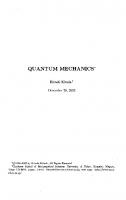Quantum Mechanics: An Empiricist View 019824861X, 9780198248613
After introducing the empiricist point of view in philosophy of science, and the concepts and methods of the semantic ap
131 24 4MB
English Pages 560 [559] Year 1991
Table of contents :
Title
Copyright
Epigraph
Preface
Summary table of contents
Contents
1. What Is Science?
1. Two views about science
2. Theories and models
3. Interpretation: science as open text
4. Models and scientific practice
5. More about empiricism
PART I. DETERMINISM AND INDETERMINISM IN CLASSICAL PERSPECTIVE
2. Determinism
1. How symmetry is connected to determinism
2. State-space models and their laws
3. Symmetry, transformation, invariance
4. Symmetries of time: classical (in)determinism
5. Conservation laws and covariance
3. Indeterminism and Probability
1. Pure indeterminism and the modalities
2. Probability as measure of the possible
3. Symmetry and a priori probability
4. Permutation symmetry: De Finetti's representation theorem
5. Ergodic theory: underlying determinism
6. A classical version of Schroedinger's equation
7. Holism: indeterminism in compound systems
PART II. HOW THE PHENOMENA DEMAND QUANTUM THEORY
4. The Empirical Basis of Quantum Theory
1. Threat of indeterminism
2. Causality in an indeterministic world
3. Deduction of Bell's Inequalities
4. The experiments
5. General description of causal models
6. Does locality really play a role?
5. New Probability Models and their Logic
1. When are values indeterminate?
2. General and geometric probability models
3. Accardi's inequalities
4. The end of counterfactual definiteness
5. Models of measurement: a trilemma for interpretation
6. Introduction to quantum logic
7. Is quantum logic important?
PART III. MATHEMATICAL FOUNDATIONS
6. The Basic Theory of Quantum Mechanics
1. Pure states and observables
2. Pure states, observables, and vectors
3. Observables and operators
4. Mixed states and operators 157 5. Gleason's theorem and its implications
6. Symmetries and motion: Schroedinger's equation
7. Symmetries and conservation laws
8. The radical effect of superselection rules
7. Composite Systems, Interaction, and Measurement
1. Composition
2. Reduction
3. Interaction and the ignorance interpretation of mixtures
4. The quantum-mechanical theory of measurement
5. Preparation of state
PART IV. QUESTIONS OF INTERPRETATION
8. Critique of the Standard Interpretation
1. What is an interpretation?
2. Two forms of indeterminism
3. What happens in measurement? von Neumann's answer
4. Von Neumann's first defence: consistency of measurement
5. Von Neumann's second defence: repeatable measurement
6. R. I. G. Hughes's argument from conditional probability
7. Two cat paradoxes and the macro world
8. Macroscopic character and superselection rules
9. Modal Interpretation of Quantum Mechanics
1. The modal interpretation
2. The modal account developed
3. What happens in a measurement?
4. Puzzle: how far does holism go?
5. Puzzle: is there chaos behind the regularities?
6. The resources of quantum logic
7. The modal interpretation, quantum-logically
8. Modal interpretation of composition and reduction
9. Consistency of the description of compound systems
10. Interpretation and the virtue of tolerance
10. EPR: When Is a Correlation Not a Mystery?
1. The paper by Einstein, Podolsky, and Rosen
2. Initial defence of the argument
3. The step to empirical testability
4. How are correlations explained?
5. Attempts at perfect explanation
6. Sinister consequences and spooky action at a distance
7. The end of the causal order?
11. The Problem of Identical Particles
1. Elementary particles: aggregate behaviour
2. Permutation invariance and the Dichotomy Principle
3. The Exclusion Principle
4. Blokhintsev's proof of the fermion-boson dichotomy
5. Permutations as superselection operators
6. Quantum-statistical mechanics
7. Classical 'reconstruction' via Carnap and via De Finetti's Theorem
8. The modal interpretation applied to aggregate behaviour
9. Possible world-models for quantum mechanics
10. The Exclusion Principle in the modal interpretation
11. A fermion model with individuation
12. Bosons and genidentity
12. Identical Particles: Individuation and Modality
1. Are there individual particles?
2. Brief exposition of second quantization
3. Three parallel debates in metaphysics
4. The identity of indiscernibles
5. Conclusion: good-bye to metaphysics
Notes
Bibliography
Index
Title
Copyright
Epigraph
Preface
Summary table of contents
Contents
1. What Is Science?
1. Two views about science
2. Theories and models
3. Interpretation: science as open text
4. Models and scientific practice
5. More about empiricism
PART I. DETERMINISM AND INDETERMINISM IN CLASSICAL PERSPECTIVE
2. Determinism
1. How symmetry is connected to determinism
2. State-space models and their laws
3. Symmetry, transformation, invariance
4. Symmetries of time: classical (in)determinism
5. Conservation laws and covariance
3. Indeterminism and Probability
1. Pure indeterminism and the modalities
2. Probability as measure of the possible
3. Symmetry and a priori probability
4. Permutation symmetry: De Finetti's representation theorem
5. Ergodic theory: underlying determinism
6. A classical version of Schroedinger's equation
7. Holism: indeterminism in compound systems
PART II. HOW THE PHENOMENA DEMAND QUANTUM THEORY
4. The Empirical Basis of Quantum Theory
1. Threat of indeterminism
2. Causality in an indeterministic world
3. Deduction of Bell's Inequalities
4. The experiments
5. General description of causal models
6. Does locality really play a role?
5. New Probability Models and their Logic
1. When are values indeterminate?
2. General and geometric probability models
3. Accardi's inequalities
4. The end of counterfactual definiteness
5. Models of measurement: a trilemma for interpretation
6. Introduction to quantum logic
7. Is quantum logic important?
PART III. MATHEMATICAL FOUNDATIONS
6. The Basic Theory of Quantum Mechanics
1. Pure states and observables
2. Pure states, observables, and vectors
3. Observables and operators
4. Mixed states and operators 157 5. Gleason's theorem and its implications
6. Symmetries and motion: Schroedinger's equation
7. Symmetries and conservation laws
8. The radical effect of superselection rules
7. Composite Systems, Interaction, and Measurement
1. Composition
2. Reduction
3. Interaction and the ignorance interpretation of mixtures
4. The quantum-mechanical theory of measurement
5. Preparation of state
PART IV. QUESTIONS OF INTERPRETATION
8. Critique of the Standard Interpretation
1. What is an interpretation?
2. Two forms of indeterminism
3. What happens in measurement? von Neumann's answer
4. Von Neumann's first defence: consistency of measurement
5. Von Neumann's second defence: repeatable measurement
6. R. I. G. Hughes's argument from conditional probability
7. Two cat paradoxes and the macro world
8. Macroscopic character and superselection rules
9. Modal Interpretation of Quantum Mechanics
1. The modal interpretation
2. The modal account developed
3. What happens in a measurement?
4. Puzzle: how far does holism go?
5. Puzzle: is there chaos behind the regularities?
6. The resources of quantum logic
7. The modal interpretation, quantum-logically
8. Modal interpretation of composition and reduction
9. Consistency of the description of compound systems
10. Interpretation and the virtue of tolerance
10. EPR: When Is a Correlation Not a Mystery?
1. The paper by Einstein, Podolsky, and Rosen
2. Initial defence of the argument
3. The step to empirical testability
4. How are correlations explained?
5. Attempts at perfect explanation
6. Sinister consequences and spooky action at a distance
7. The end of the causal order?
11. The Problem of Identical Particles
1. Elementary particles: aggregate behaviour
2. Permutation invariance and the Dichotomy Principle
3. The Exclusion Principle
4. Blokhintsev's proof of the fermion-boson dichotomy
5. Permutations as superselection operators
6. Quantum-statistical mechanics
7. Classical 'reconstruction' via Carnap and via De Finetti's Theorem
8. The modal interpretation applied to aggregate behaviour
9. Possible world-models for quantum mechanics
10. The Exclusion Principle in the modal interpretation
11. A fermion model with individuation
12. Bosons and genidentity
12. Identical Particles: Individuation and Modality
1. Are there individual particles?
2. Brief exposition of second quantization
3. Three parallel debates in metaphysics
4. The identity of indiscernibles
5. Conclusion: good-bye to metaphysics
Notes
Bibliography
Index

- Author / Uploaded
- Bas C. van Fraassen

![An Axiomatic Basis for Quantum Mechanics: Quantum Mechanics and Macrosystems (vol. 2) [1.0]
9783540137733](https://ebin.pub/img/200x200/an-axiomatic-basis-for-quantum-mechanics-quantum-mechanics-and-macrosystems-vol-2-10-9783540137733.jpg)







